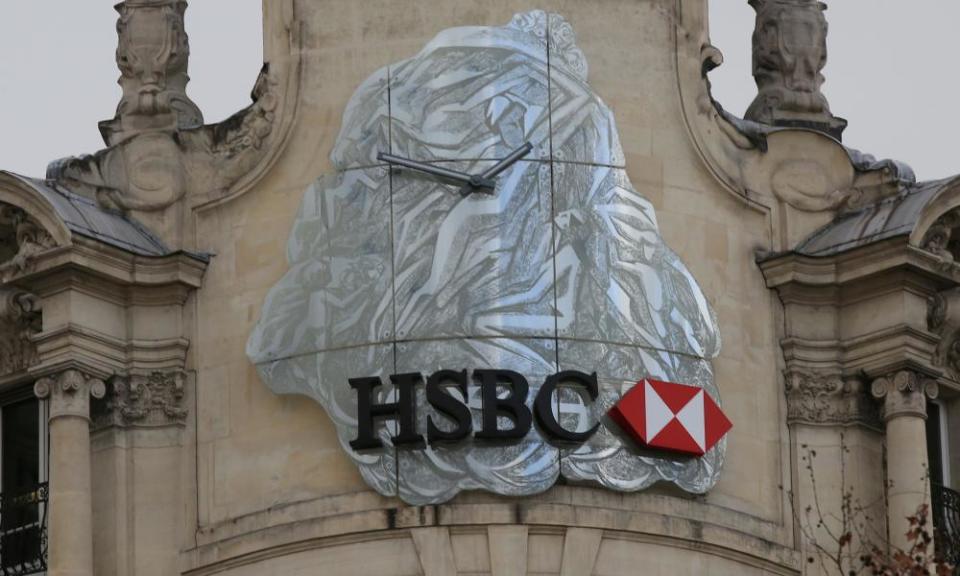City watchdog investigating HSBC over potential financial crime, bank reveals

The City regulator is investigating HSBC over potential breaches of money laundering rules after concerns raised last year by the anti-crime monitor installed in Britain’s biggest bank.
The bank did not disclose the specific concerns raised by the American lawyer Michael Cherkasky, who was appointed as the monitor five years ago. He is reported to have raised concerns about clients with links to terrorism, including Isis.
Chekraksy was appointed after the £1.2bn fine imposed on HSBC in 2012 by the US for poor anti-money laundering controls and is overseeing attempts to improve its defences against financial crime.
The Financial Conduct Authority did not comment but the bank said it was “the subject of an investigation by the FCA into its compliance with UK money laundering regulations and financial crime systems and controls requirements”.
As the bank reported a 62% slump in 2016 profits on Tuesday, its chief executive Stuart Gulliver said the bank was unearthing more regulatory problems due to higher-quality internal policing, adding the business had “been able to identify more bad actors in our 37m customer base”. He said it was “quite normal” to uncover such instances in a bank the size of HSBC which operates in 70 countries and has 240,000 staff.
Gulliver said: “Our monitor has raised certain concerns but we have continued to progress and our commitment remains unwavering. By the end of this year, we are on track to have our anti-money laundering and sanctions policy framework in place and to have introduced major compliance IT systems across the group.”
He described the FCA’s investigation as a section 166 reportwhich means a review by an independent firm that could lead to fines if wrong doing is uncovered.
Cherkasky’s criticism that HSBC was too slow to improve its systems was taken into account when paying top staff: the part of Gulliver’s pay measured against compliance with financial crime received a 65% rating from the remuneration committee, compared with 75% a year earlier. This was reported to amount to a 2.5% cut.
Sam Laidlaw, the non-executive director who chairs the remuneration committee, said this followed “feedback received from the monitor, matters arising from risk and compliance incidents, and a number of unsatisfactory internal audits covering anti-money laundering (AML) and sanctions-related issues”.
Even so Gulliver’s overall pay is ising from £7.3m to £7.7m. Pay of “certain individuals” was reduced by $12.1m (£9.7m) to “reflect their involvement in certain notable events and individual transgressions” while 245 were paid more than £1m compared with 226 a year ago. One received €11m (£8.8m).
The overall bonus pool was cut by 12% – which will be closely watched as all the other major UK banks report in their results in the coming days.
The monitor had also expressed concerns a year ago and on Tuesday HSBC highlighted concerns “instances of potential finance crime that the DoJ [department of justice] and HSBC are reviewing further and on-going systems and control deficiencies that in [the monitor’s] view raised questions as to about whether HSBC is adhering to all its obligations under the US DPA”.
Gulliver has been pulling back from riskier operations, including its Swiss private bank and the 62% fall in profits – down to $7.1bn – was in part caused by a $3.2bn writedown on the total value of the takeover of the Safra private bank in 1999. In 2015, the Guardian and other publications revealed the Swiss arm of HSBC helped clients dodge tax and the bank revealed it had now set aside $773m aside for various tax investigations.
Without the one-off hits, profits were flat at $19.3bn and the bank tried to please shareholders by buying back $1bn of shares, on top of $2.5bn announced in August. The dividend is held at 51 cents a share.
But the bank’s shares, which have risen 55% since the EU referendum, endured one of their biggest one day falls since the depths of the banking crisis. Ian Gordon, an analyst at Investec said, said the figures were a “grim reality” while analysts at Bernstein said “HSBC missed on income and capital”.
Revenue fell in 2016, a year which chairman Douglas Flint said would be “long remembered for its significant and largely unexpected economic and political events”.
Investors looking for news about Flint’s successor may have been left disappointed as he said an announcement would be made “in due course”. Gulliver indicated Flint could stay on until next year if a replacement was not found until later in 2017. Laidlaw, who is leading the search for Flint’s replacement, is leaving at the annual meeting.
Flint highlighted potential risks to the markets, including “the threat of populism impacting policy choices in upcoming European elections”, while Gulliver talked about the end of globalisation.
“If globalisation continues to retreat, as seems likely, we are in a strong position to capitalise on the regional opportunities that this will present, particularly in Asia and Europe,” said Gulliver.
Flint said the bank would need to relocate 1,000 staff from London to Paris “progressively over the next two years” as a result of the Brexit vote but half of them were French.

 Yahoo Finance
Yahoo Finance 